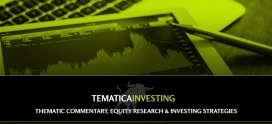Set a Protective Stop on a Winning Position to Lock in a Gain of More than 20%
What began as a bad start to 2016 only has gotten worse over the last few days. There are a number of reasons behind this move lower as II see the stock market, at best, moving sideways through earnings season, but more likely to come under additional pressure as expectations are scaled back. When I say expectations, I mean those for global growth, oil prices, corporate earnings and so on. You’ve seen me write more than a few times about the aggressive earnings expectations for the S&P 500 this year and the revisions lower that I’ve been expecting have only just begun.
In an environment like this, it tends to be shoot first and ask questions later, particularly as growth expectations get reset. While it is tempting to weather the storm, my preference is to lock in existing gains, limit losses and, above all, preserve capital at times such as this one. I know times like now, when the market seemingly goes down day after day, can be frustrating, if not confusing. I would not be surprised if you were having flashbacks to March 2008, wondering if we are heading for a repeat of what happened from May 2008 to March 2009, a period of intense pain for the stock market.
The famous phrase, “better safe than sorry,” comes to mind. For us, that means exiting the following positons:
- Changing our rating on USA Technologies (USAT) to “Sell”, booking a near 30% return since our “Buy” rating was issued.
- Updating Kraft Heinz (KHC) to a “Sell” rating, marking a hefty double-digit percentage return.
- Closing out Disney (DIS), Under Armour (UA), Netflix (NFLX), LifeLock (LOCK), American Airlines (AAL) and Fitbit (FIT) — updated all with a “Sell” rating.
- That leaves Physicians Reality Trust (DOC), Philip Morris (PM), American Capital Agency (AGNC), AT&T (T) and Regal Cinemas (RGC) in the Tematica Select List — all of which have dividend yields between 4.6% (Philip Morris) and 14% (American Capital Agency). Given the nature of their businesses as well as those dividend yields, those shares are apt to drum up investor interest as people look for safe havens.Let’s continue to hold these shares and “clip our dividend coupons” along the way.
- Also, we recommend investors add some protection in the form of the ProShares Short S&P 500 ETF (SH), which trades in the opposite direction of the S&P 500.
Over the next few weeks, we could get a bounce in the market here and there, but I would feel much better putting capital to work with a strong conviction that the storm has passed. As such, I will keep one eye on the market (the indicator of price) and the other on our investing themes as I look for data points that show companies whose businesses will continue to perform regardless of what’s happened in the stock market over the last month or will happen in the next month or next few months. If you were with me while I write this update, you would hear me muttering questions like some of these:
- Has the drop in the stock market changed the outlook for cyber attacks and related threats in 2016? Safety & Security
- Despite the unseasonably warm temperatures in the eastern United States thanks to El Niño, has the California drought situation been eradicated? Scarce Resources
- Has the shift toward streaming and other digital content consumption slowed because the stock market has lost close to $1 trillion in value, lessening the demand for content? Connected Society
- By some strange hocus-pocus, have people been “de-aged” so that less than 15% of the population is over 65 years old? Aging of the Population
- As if by magic, did all of those people with little to no retirement savings suddenly land on firm financial footing? Aging of the Population
- Over the last few days, has the costly and deadly impact of obesity and the prevalent condition of so many people being overweight been reversed? Fattening of the Consumer
- Have retailers, both brick & mortar as well as online, shifted to only taking cash and checks as payment for goods and services? Cashless Consumption
- Are people all of a sudden smoking less in the last few days? If anything, I would argue those who do indulge in this guilty pleasure are probably smoking more and having an extra drink or two along with it. Guilty Pleasure/Affordable Luxury
- Has the domestic middle class started to expand dramatically in January? Rise and Fall of the Middle Class
And so on… Foods with Integrity… Asset-Lite Business Models… Economic Acceleration/Deceleration… Tooling & Retooling…
The bottom line is these investing themes of ours continue to benefit from the shifting and evolving landscape that is the intersection of the global economy, changing demographics, disruptive technologies, regulatory mandates and other tailwind drivers.
As I said earlier, the stock market is simply the indicator of price.
If you saw a great product on sale at the store, you would be excited, maybe even ecstatic, if it was one you had been looking at for some time. The same is true with stocks!
We tend to get caught up in the emotional response of the market moving lower, which usually is viewed as a bad thing, rather than an OPPORTUNITY to buy shares at an even better price. When viewed through that lens, who doesn’t love it when stocks go on sale… so long as the fundamentals and business drivers remain intact. To me, this says we’ll be able to buy back a number of the growth positions at the same or lower prices when the current market storm has cleared and things have settled down. Let’s be prudent and patient together.




